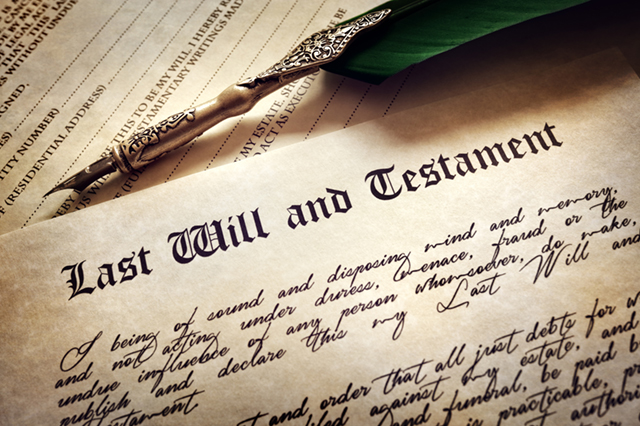If you’re in the midst of retirement planning, you’re probably thinking about your social security benefits, how much money you should be saving and the best places to retire. But have you taken care of your will and estate planning yet?
We know, it’s not the cheeriest of subjects, but always putting it off until later can cause big problems down the road.
Without a legal will, you’ll have zero control over who gets what after you’re gone. The fate of your house, your grandmother’s earrings and even the guardianship of your dependent children will be decided by strangers in a probate court.
This can be a very difficult experience for your loved ones (especially if you and your life partner are not married), so don’t leave this important part of retirement planning until it’s too late.
Thanks to online resources, writing a will is simple, quick and inexpensive. And if you take care of things now, you can spend more time focusing on the fun stuff. Read on to learn more about creating a will, and whether you should also establish a trust.
Writing a Will
Your first priority should be writing a last will and testament. If your assets are fairly simple, you can create a basic will online through a website such as LegalZoom, RocketLawyer, MetLife Legal Plans or LegalShield.* These services are affordable and will guide you step-by-step through the process. If your situation is more complicated, you may need the help of an attorney.
In your will you’ll provide instructions for who should receive your property and assets. You can include items such as:
- Real estate
- Money in bank accounts
- Stocks, bonds and intellectual property
- Artwork, jewelry and furniture

Explicitly naming who gets what will ensure that your wishes are carried out, and can prevent disagreements between family members.
And if you have dependent children (minor-aged or disabled), the most important part of your will is to name a legal guardian to care for them. Without a will, the probate court will get to decide this.
You’ll also designate an executor who will make sure all debts and taxes are paid and will handle the distribution of your property. This will reduce the cost of probate court, avoid unnecessary taxes and fees and ensure a faster and more efficient transfer of assets. If the process is handled by a court-appointed administrator it could take more than a year for them to track down and manage all your assets, which could negatively impact your loved ones.
Outside of your will, it’s very important to make sure the beneficiaries you’ve named for your IRAs, 401(k)s or life insurance policies are current and up to date. These retirement accounts and financial products are also legal contracts and will supersede your will. So even if you’ve named your child in your will as the beneficiary of your 401(k), if your ex-spouse is still listed on your 401(k), they’ll be the one receiving your money. The death benefit also can be assigned to someone’s estate if there is no beneficiary, and then the death benefit becomes taxable.
Five Wishes
In addition to creating a will, you might want to consider completing a living will similar to the Five Wishes Advanced Planning Guide. It is legal document offered in New York, New Jersey, Connecticut, Massachusetts and Rhode Island in which people specify their medical directives, including designating someone to make health care decisions for them if they are unable to, and designate end-of-life-care.
Creating a Trust
If you have significant net worth and substantial real estate holdings, you may want to explore establishing a trust alongside your will. Trusts are more expensive and complex to set up, so it’s a route worth considering only if deemed necessary.
When establishing a trust you’ll transfer legal ownership of your assets to the trust itself and appoint a trustee to manage the assets. With a living trust you can designate yourself as the trustee so you can maintain control of your assets. You’ll also name a successor trustee who will distribute your assets to their intended beneficiaries after your death.
Establishing a trust can be beneficial for several reasons:
- Greater control over your assets – You can be more specific about who gets what and when, such as deferring release of funds to your children until they reach a certain age or providing for a beloved pet or charity.
- Faster settlement process – Your heirs will be able to receive their assets without having to go through probate court which could take anywhere from three months to several years.
- Minimizes cost – Probate court costs can be as much as 3% to 7% of your estate.
- Privacy – Since your assets are not going through probate court, they will not become public record.
- Harder to contest – If a disgruntled family member contests how you’ve chosen to distribute your assets, a trust will hold up better than a will.
There are many different types of trusts, and if you’re considering setting one up you’ll want to discuss your options with an estate planning attorney.
Have you gotten started on your will and estate plans yet, or have you been putting off this important part of retirement planning?
*Links are provided for informational purposes only and are not an endorsement from AAA Northeast.
2 Thoughts on “What to Know About Wills and Estate Preparation”
Leave A Comment
Comments are subject to moderation and may or may not be published at the editor’s discretion. Only comments that are relevant to the article and add value to the Your AAA community will be considered. Comments may be edited for clarity and length.
















Have completed and have had notarized all estate documents via Legal Zoom. Are these documents considered legal? And, does the trust created meet the requirements of the Medicare five-year ‘look back’ period?
Hi there!
Thanks for reading! I would recommend getting in touch with an attorney regarding your estate and trust questions.
Thanks so much!
-Dana